Description
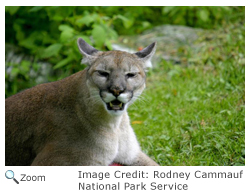 The Florida panther is a subspecies of the mountain lion. It has short, light brown fur and a white muzzle, chest, and stomach. It has a long tail with a slight crook in it. The crooked tail and a whorl of hair on its back are characteristics that make it different from the mountain lion. Males are between seven and eight feet long and weigh between 100 and 160 pounds. Females are about six feet long and weigh between 60 and 100 pounds. The Florida panther is a subspecies of the mountain lion. It has short, light brown fur and a white muzzle, chest, and stomach. It has a long tail with a slight crook in it. The crooked tail and a whorl of hair on its back are characteristics that make it different from the mountain lion. Males are between seven and eight feet long and weigh between 100 and 160 pounds. Females are about six feet long and weigh between 60 and 100 pounds.
Range
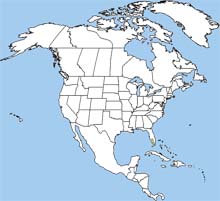 The Florida panther's range is limited to small areas in southern Florida. It can be found in the Everglades National Park and Big Cypress National Preserve. The Florida panther once roamed large areas of the southeastern United States, but hunting and settlement severely hurt its population. There are currently fewer than 100 panthers in the wild in Florida. The Florida panther is an endangered species. The Florida panther's range is limited to small areas in southern Florida. It can be found in the Everglades National Park and Big Cypress National Preserve. The Florida panther once roamed large areas of the southeastern United States, but hunting and settlement severely hurt its population. There are currently fewer than 100 panthers in the wild in Florida. The Florida panther is an endangered species.
Habitat
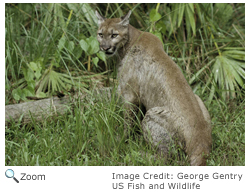 The Florida panther lives in both wetlands and drylands. It lives in cypress forests, thicket swamps, and freshwater marshes. Its dry habitat includes hardwood hammocks, saw palmetto woodlands, and pine flatwoods. It prefers areas with lots of cover. The panther is a good swimmer and often moves between wetlands and drylands. The Florida panther lives in both wetlands and drylands. It lives in cypress forests, thicket swamps, and freshwater marshes. Its dry habitat includes hardwood hammocks, saw palmetto woodlands, and pine flatwoods. It prefers areas with lots of cover. The panther is a good swimmer and often moves between wetlands and drylands.
Diet
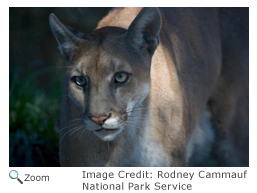 The Florida panther is a carnivore. Its favorite prey is the white-tailed deer. It also eats raccoons, armadillos, birds, and other small prey. It stalks its prey and pounces on it, bites the animal's neck and cuts the spinal chord. It may also suffocate its prey by grabbing it by the throat and cutting off its air. The panther then drags its food to a safe place. It eats part of the animal and covers the rest with grass and eats it later. Depending on the size of the kill, it may feed on it for three or four days. The Florida panther is a carnivore. Its favorite prey is the white-tailed deer. It also eats raccoons, armadillos, birds, and other small prey. It stalks its prey and pounces on it, bites the animal's neck and cuts the spinal chord. It may also suffocate its prey by grabbing it by the throat and cutting off its air. The panther then drags its food to a safe place. It eats part of the animal and covers the rest with grass and eats it later. Depending on the size of the kill, it may feed on it for three or four days.
|
|
Life Cycle
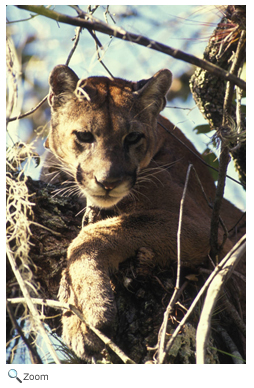 Mating season runs from October through March. The female is ready to mate when she is between two and three years old. When a female is ready to mate, she leaves scent markings for the male to find. Kittens are born after about three months. The mother prepares a den in a dry and protected place, like a thicket. She gives birth to between one and three kittens. The kittens are blind and have spotted coats and blue eyes. In about two to three weeks, their eyes open and they begin to walk. Mating season runs from October through March. The female is ready to mate when she is between two and three years old. When a female is ready to mate, she leaves scent markings for the male to find. Kittens are born after about three months. The mother prepares a den in a dry and protected place, like a thicket. She gives birth to between one and three kittens. The kittens are blind and have spotted coats and blue eyes. In about two to three weeks, their eyes open and they begin to walk.
The kittens stay in or near the den for about two months. They are weaned and start eating meat when they are about two months old. The spots on their coats begin to fade after four to six months. They leave their mother when they are about a year and a half old. Once they leave their mother, they establish their own territory.
Behavior
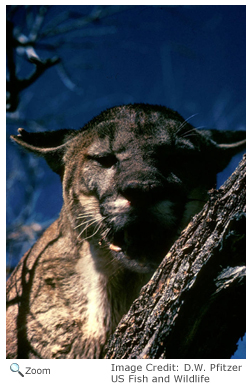 The Florida panther is solitary animal. A male's home range can be up to 250 square miles. A female's home range is usually between 70 and 200 square miles. Territories may overlap. Dominant animals usually have the better territories. Males fight other males that invade their territory. The panther marks its territory with markings called scrapes. Scrapes are piles of dirt and grass scratched up with the panther's hind legs. They are about six inches long and are usually marked with urine. The Florida panther is solitary animal. A male's home range can be up to 250 square miles. A female's home range is usually between 70 and 200 square miles. Territories may overlap. Dominant animals usually have the better territories. Males fight other males that invade their territory. The panther marks its territory with markings called scrapes. Scrapes are piles of dirt and grass scratched up with the panther's hind legs. They are about six inches long and are usually marked with urine.
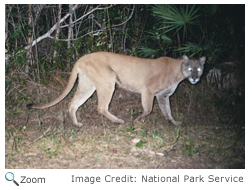 The Florida panther is most active at night. It can travel up to 20 miles a day and can run in short bursts of up to 35 miles an hour. The Florida panther is most active at night. It can travel up to 20 miles a day and can run in short bursts of up to 35 miles an hour.
|